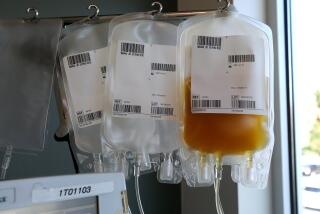FDA Approves Technique for Cleaning Blood Plasma
- Share via
WASHINGTON — The Food and Drug Administration on Wednesday approved a new technology that allows scientists to wash certain viruses, including the AIDS virus, out of plasma.
The FDA’s approval comes amid a Justice Department antitrust investigation of the American Red Cross’ exclusive contract for this “scrubbed blood,” but the first batches of new plasma will be ready to ship to interested hospitals in two weeks, authorities said.
The nation’s blood supply already is very safe because of intense testing. But scientists have been hunting for ways to make it even safer, avoiding even the occasional infection that slips through.
The new solvent-detergent plasma, or SD plasma, “provides an added layer of protection,” said Red Cross President Elizabeth Hanford Dole.
SD plasma will replace some of the 2.5 million units of plasma, the liquid part of blood, used by tens of thousands of Americans to treat certain diseases. It does not clean the 13 million units of red blood cells transfused into millions of Americans every year.
And it comes with a downside: The plasma can be washed only if donations from about 2,000 people are pooled. That means if a virus that doesn’t respond to the washing technique--such as hepatitis A--slips in, many more people would be exposed.
The New York Blood Center developed the solvent-detergent technology, cleansers that dissolve the fatty coating of such viruses as HIV, hepatitis B and hepatitis C.
It has been used in drugs made from plasma, such as immune globulin or hemophiliacs’ clotting factor, for years. But in 1994, the New York Blood Center created a company called Vitex, or V.I. Technologies Inc., to sell it for cleaning whole plasma. Vitex, in turn, licensed the Red Cross to distribute supplies.
The Red Cross will market SD plasma under the brand name PLAS+SD.
The deal sparked a Justice Department antitrust investigation centering on concern that the arrangement created a monopoly. The Red Cross denies antitrust violations and will sell SD plasma to its competitors for an undisclosed markup but for less than retail price.
Still, smaller blood banks that combine to provide half the nation’s blood supply fear that the move could put some of them out of business.
Hospitals may soon get another alternative: The Sacramento Blood Center is awaiting an FDA decision on its plan to individually package each donor’s plasma, freeze it for 90 days, then retest the donor. This virtually eliminates today’s blood-testing drawback that an occasional donor is so newly infected that tests don’t immediately spot infection, said Harvey Klein, transfusion chief at the National Institutes of Health.
More to Read
Inside the business of entertainment
The Wide Shot brings you news, analysis and insights on everything from streaming wars to production — and what it all means for the future.
You may occasionally receive promotional content from the Los Angeles Times.









